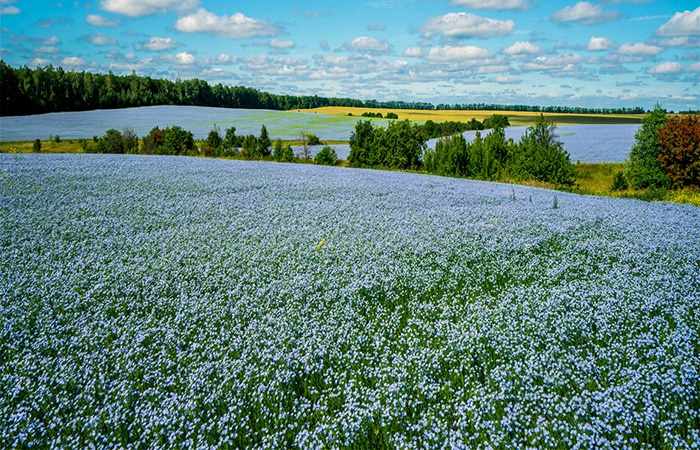People have known about the health benefits of cod liver oil for a very long time. The first documented use is that of Dr. Samuel Kay of the Manchester infirmary who imported it from Newfoundland for internal use as early as 1776. Back then we did not know why it was healthy but since then many medical studies have shown that it is the omega-3 oil that has health benefits such as preventing or managing Type 2 diabetes, kidney disease, rheumatoid arthritis, high blood pressure, heart disease, stroke, and inflammation in general.
We now also know that flax seed oil contains the same omega-3 oil in high quantities.
So, you may ask why nobody grows the beautiful blue fields of flax in Manitoba anymore. In the last 30 years there have been two “loser” crops in Manitoba. Barley and Flax have both gone from being significant crops in Manitoba to not even showing up on a list of top 10 crops to grow. We used to grow more than 500,000 acres of flax in the 1990’s but today we are growing less than 50,000 acres annually.
There are several reasons for this. First, the yield of flax has not increased significantly and been quite variable over the years compared to other crops like wheat, oats, canola, corn, and soybeans. The cause of the low and variable yield can be attributed to insects and diseases but mostly to low natural phosphorous levels in the soil. You see, flax cannot absorb fertilizer phosphorous but relies exclusively on mychorrizae to supply its phosphorous. Mychorrizae is a beneficial fungus in the soil that provides phosphorous to plants in exchange for carbohydrates. Unfortunately, when we apply fertilizer phosphorous, we suppress the population of mychorrizae in the soil. The other major factor reducing mychorrizae is canola crops. Canola does not support mychorrizae and because we have so many canola acres, mychorrizae have little chance of thriving.
Another reason flaxseed oil does not appear on our grocery shelves is because the omega-3 fatty acid is very unstable and goes rancid quickly. Two options exist to make flaxseed oil marketable: sell it as a whole seed and crush it at home just before you use it or sell it in small dark colored containers stored in a cool dark place. Marketers and consumers tend to prefer convenience to health, so they choose other oils that have a better shelf life.
Flax seed has other non-edible uses that also seem to be on the decline. It is a great base for paint or used straight as linseed oil to preserve wood and prevent metal from rusting. It has also been used to make linoleum, a non-toxic plant-based flooring. Flax straw can be used to make fine papers and linen. Linen has been manufactured and used for the last 8500 years and may come back as a great alternative material after we run out of fossil fuels to make our polyesters and nylon and Dacron and Kevlar.




